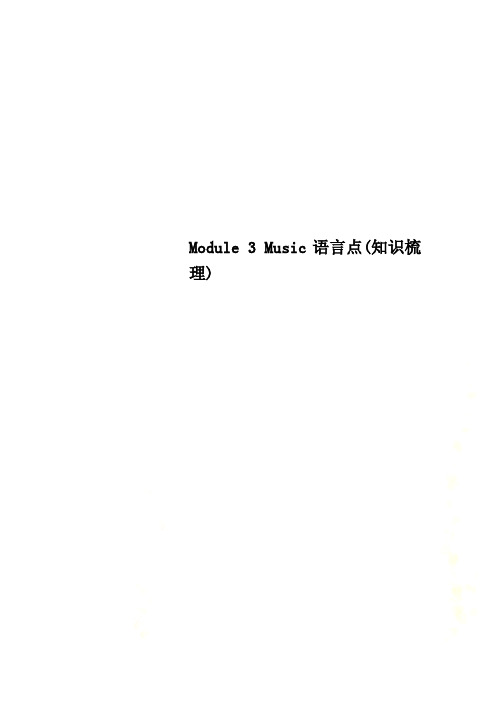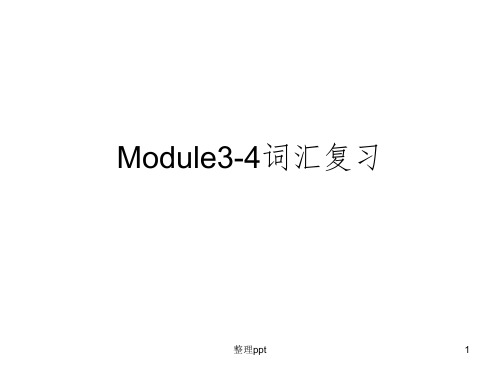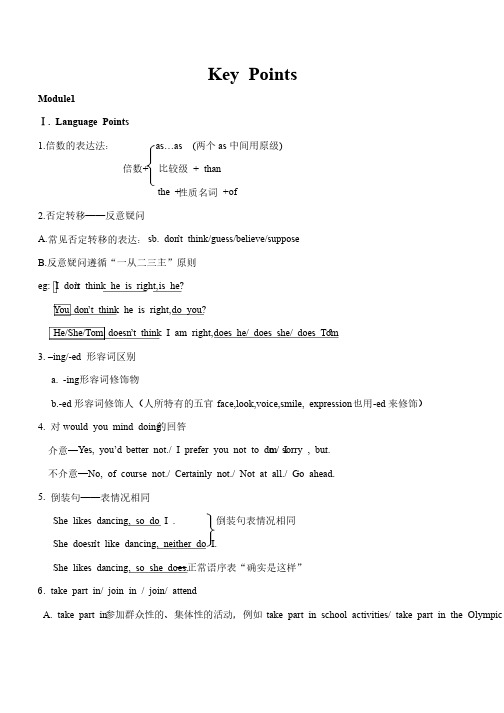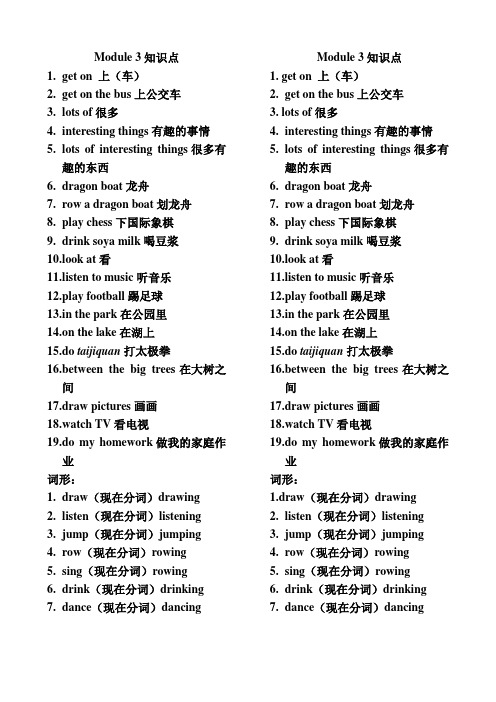Module 3 模块回顾整理
Module 3 Music语言点(知识梳理)

Module 3 Music语言点(知识梳理)等。
There was a large/ small audience in the hall.大厅里的观众很多/很少。
The artists performed wonderfully and the audiences were in high spirits.艺术家们表演的很棒,并且观众们都情绪高涨。
The audience was large.观众数目很大。
The audience were all waving their hands.观众都挥舞着手。
lose【原句回放】Decide which of these words you expect to see in a passage about music: ...lose... 在一篇关于音乐的文章中,决定一下你希望看到下列单词的哪一个:……失去【点拨】lose vt.丢失,失去(lost, lost)My dog was lost/ missing/ gone.我的狗丢了。
It was raining hard; what was worse, he was lost in the forest.天在下雨,更糟糕的是,他在树林里迷路了。
be lost in 沉迷于,陷入某种状态The young girl was lost in a muse.这女孩陷入了沉思。
【拓展】lose的相关搭配:lose one’s life丧命;lose interest in/ weight/ speed 失去兴趣/减肥/减速;lose oneself in doing sth. 沉迷于;专心致志于某事;lose oneself in thought=be lost in thought 陷入沉思;lose one’s balance失去平衡;confidence 失去信心;lose one’s breath 上气不接下气;lose heart 灰心;泄气;lose one’s way 迷路;lose the game 输掉比赛;lose face丢面子;lose one’s way 迷路;lose one’s temper 发脾气compose【原句回放】Joseph Haydn (1732~1809) was an Austrian composer an d is known as “the father of the symphony ”. 约瑟夫·海顿(1732~1809)是一位奥地利作曲家并且被称为“交响乐之父”。
牛津英语模块三unit3知识小结

牛津英语模块三u n i t3知识小结(总6页)-CAL-FENGHAI.-(YICAI)-Company One1-CAL-本页仅作为文档封面,使用请直接删除重点短语be in use 在使用中 set sail for 去航去by the time 到......时候 lead to 导致as early as 早在 in the future将来take over 接管,接任,控制 lost civilization失落的文明in memory of 纪念 in return for 作为。
的回报carry out实施,执行,进行 no more不再be off to 出发去 too...to 太...而不能pour out 涌出,倾泻 attend a lecture去听演讲more than 多于, 不仅仅 be buried alive被活埋be covered with被。
覆盖 be known aseither ... or 或者。
或者 neither ... nor 既不。
也不not only ...but also不但。
而且 it turns out that 结果证明是/ 原来on board在船上,飞机上或火车上 in good condition处于良好的状态prevent sb. from sth/ doing sth 阻止某人做某事 cut down 砍到declare war against 向。
宣传 together with 和。
在一起dig ...for treasure挖...找财宝 be involved in 参与,与...有关联result in 导致 take ... as an example 以...为例Be considered to be... 被认为是 have the chance to do sth 有机会做of great value 具有很大的价值take 相关短语take over 夺取,接管,控制,管理,继承 take away _________ take off_______ take up__________ take time to do sth ____________ take charge of __________ put 相关短语put out发表,发布,熄灭,出版 put off ___________ put on _____________put up___________ put up with__________put 相关短语come to达到某种情况或状态 come to oneself 苏醒 when it comes to谈到...涉及.. come across ___________ come up with __________ come out__________1.集中于2.对……有影响3. 受够了某人4. 阻碍(某人)5. 患病Come的相关短语:流传,降落:come 找到解决办法:come发生: come 发芽,出版:come偶遇: come 总计:come6. 实施,进行7. 阻碍(某人)8. 起义,反抗 9. 研究……10. 与……有关11. 无疑,确实翻译:毫无疑问他会成功词类转换decorate (vt.) 装潢、装饰→ ________ (n.) 装潢、装饰declare (vt.) 宣布,宣称→ _________ (n.)宣布,宣称,宣言educate (vt.) 教育→ ________ (n.) 教育→ ________ (n.) 教育者complain (vi.) 抱怨→ ________ (n.) 抱怨corrupt (vt.) 使腐败,使堕落(adj.)贪污的,腐败的→ ________ (n.) 贪污,腐败erupt (vi) (火山等)迸发,喷发,喷出,爆发→ __________ (n.) 爆发aware (adj.) 意识的,察觉到的→ __________ (n.)意识,认识historical (adj.) 历史的,与历史研究相关的→ ________ (n.)历史powerful (adj.) 强有力的→ ________ (n.) 权利wealthy (adj.) 富有的,富裕的→ ________ (n.) 财富,钱财cultural (adj.) 文化的→ ________ adv.)文化上地→ ________(n.) 文化extreme (adj.) 极度的,极端的→ ________ (adv.) 极其,极端fortunate (adj.) 不幸的,运气不好的→ __________(adj.) 幸运的,侥幸的→________ (adv.) 幸运地,侥幸地gradually (adv.) 逐渐地→ ________ (adj.) 逐渐的remains (n.) 遗迹→ ________ (vi.) 留下,剩下→ ________ (adj.) 剩余的judge (n.) 法官,审判者,裁判员→ ________ (n.) 审判,判决poison (n.) 毒药,毒物;(vt.)毒害,下毒→________ (n.) 中毒→________ (adj.) 有毒的solution (n.) 解决办法,解答→ ________ (v.) 解决,解答expression (n.) 表达,表情,神色→ ________ (v.) 表达sailor (n.) 水手,海员→ ________ (v.& n.) 航行basis (n.) 基础,基准,原因→ ________ (vt.& n.)基地,以.......为基地1. (n.) 表达;表情→(v.)表现,表达2.(adj.)强有力的,强大的→ (n.) 权力,势力3.(adj.)幸运的→(adj.)不幸的,运气不好的→(adv.)幸运地4.(vt.)宣布;宣称→ (n.) 宣言声明支持/反对5.(adj.)纪念的,记忆的→ (n.)记忆力,记忆→(v.)记忆纪念 in of;类似结构的短语:希望:in of 需要:in of搜寻:in of 支持:in of以防万一:in of 就……而言:in of6. (v.)教育,教导→ (n.)教育;培养→ (n.)教育家7. (n.) 荣耀,光荣→(adj.)光荣的;荣耀的8. (adj.)知道的,意识到的→(adj.)不知道的→(n.)知道,意识* 提高……意识9. (vt.)使腐败→(adj.)→(n.)腐败10. (n.)毒物,毒药→(vt.)毒害→(adj.)有毒的,有害的11. (vt.)判断,评价→ (n.)法官→ (n.) 判断语法填空A British club arranged for high school students to go on a cultural tour of places where there are lost civilizations. Ann felt 1 (luck) to have the chance 2_______ (visit) Pompeii in Italy and Loulan in China.On Day 1, Ann arrived in Italy. On Day 2, Ann attended a lecture about Pompeiiand gained the knowledge of the city, which was founded in the 8th century BC but 3________ (bury) underground after the volcano near the city erupted in AD 79. OnDay 3, Ann visited the ancient Roman city of Pompeii, 4_______ was discovered inthe 18th century but was much damaged because 5_______ people’s digging beforeit got protected by the government in 1860.On Day 10, Ann arrived in Loulan. She was filled with 6 _________ (excite) to bein Loulan, which was a stopping point on the famous Silk Road but was 7________ (gradual) covered over by sandstorms from AD200 to AD 400. On Day 11, Professor Zhang, a scholar from the local cultural institute, told 8_______ the discovery of Loulan---- an explorer from Europe 9_______ (call) Sven Hedin discovered the ruinsof the Loulan Kingdom around 1900. The desert was once a green land with huge trees, but they were cut down, 10_______ (cause) the city being buried by sand.Ancient Greek statue found in XingjiangA small statue of a Greek soldier was found in Xingjiang, which 1. (explain) as a result of Alexander the Great’s influence.Alexander 2. (succeed) his father to the throne when he was twenty. Thenhe led an army and took back many Greek cities3. didn’t obey him.From 334BC, Alexander took his army into the Middle East, Egypt, and thenIndia, and won every battle. He occupied more land than anyone 4. when he was thirty. Unfortunately, he died5. a fever when he was around thirty-three.Alexander had a deep influence on the world by 6. (spread) Greek culturefrom Europe to Africa and Asia.The father of Western philosophyPhilosophy is a way of looking at the world around us, or of answering the great questions of life.Socrates was the father of Western philosophy. He came from Athens, Greece and lived to the age of 70. He once worked 7. a solider, a teacher and a worker. Western thought and science have been 8. (deep) influenced by him.Socrates taught his students by asking questions to challenge them 9. develop and explain their own 10. (argue). His way of approaching the truth is now 11. (call) the Socratic Method.However, Socrates’s way of questioning everyone made many people upset, and finally he 12. (take) to court and put to death.。
Module3-4词汇复习

• 4 Can you d_e_s_c_r_ib_e___________ the design (设计)of the dress?
整理ppt
4
复习词汇
• already
• 已经
• Station
• 车站
• Part
• 部分
• Real
• 真实的
• Month
•月
• Still
• 仍然
• Discover
• 发现
• Panic
• 惊恐
• Entrance
• 入口
பைடு நூலகம்
整理ppt
5
重点词组
• Take part
• 参加
• Get on well with • 与相处融洽
• panic
• 惊恐
• entrance
• 入口
整理ppt
3
• Describe • Drop • Electricity • Health • Organisation • Diary • Environment • Universe • planet
• 描述 •丢 •电 • 健康 • 组织 • 日记 • 环境 • 宇宙 • 行星
• You should _t_a_k_e__c_a_r_e___ ___________ yourself. • 4 我们这周四要参加校庆活动
• We will __ta_k_e___p__a_rt ____________ in the school celebration.
外研版七下英语第三模块知识点

外研版七下英语第三模块知识点Module 3: The world in dangerUnit 1: Changes in the environmentKey Vocabulary:1. pollution: the presence in or introduction into the environment of a substance or thing that has harmful or poisonous effects2. environment: the surroundings or conditions in which a person, animal, or plant lives or operates3. recycling: the process of converting waste into reusable material4. global warming: a gradual increase in the overall temperature of the earth's atmosphere generally attributed to the greenhouse effect5. deforestation: the action of clearing a wide area of treesGrammar:1. Present continuous tense: We use the present continuous tense to talk about things that are happening now or at the moment of speaking.Example: The company is recycling its waste materials.2. Modal verbs: Modal verbs are used to show someone's attitude towards their action or to indicate possibility, obligation, permission, or ability.Example: We must stop polluting the environment.Reading:In this unit, students will read a variety of texts related to changes in the environment. They will learn about different types of pollution, the impact of global warming,and the importance of recycling. They will also read about the effects of deforestation on the environment and wildlife.Listening:Students will listen to conversations and interviews related to environmental changes. They will practicelistening for specific information and inference skills.Speaking:In this unit, students will practice speaking about environmental issues. They will engage in discussions, role-plays, and presentations about pollution, recycling, and global warming. They will also learn how to express their opinions and give reasons for their views.Writing:Students will learn how to write a formal letter expressing their concerns about environmental issues to a local government official or company. They will also practicewriting a persuasive essay on the importance of protecting the environment.Overall, this unit will help students develop their language skills while increasing their awareness of environmental issues and the importance of protecting the world in danger.。
外研版英语必修一Module1-Module3重点知识总结

Key Points Module1 Ⅰ. Language Points 1.倍数的表达法:倍数的表达法: as as……as (两个as 中间用原级) 倍数+ 比较级比较级 + than the +性质名词性质名词 +of 2.否定转移——反意疑问否定转移——反意疑问A.常见否定转移的表达:sb. don ’t think/guess/believe/suppose B.反意疑问遵循“一从二三主”原则反意疑问遵循“一从二三主”原则eg: I don ’t think he is right, is he? You don You don’’t think he is right, do you? He/She/Tom doesn He/She/Tom doesn’’t think I am right, does he/ does she/ does Tom ?3. –ing/-ed 形容词区别形容词区别a. -ing 形容词修饰物形容词修饰物b.-ed 形容词修饰人(人所特有的五官face,look,voice,smile, expression 也用-ed 来修饰)来修饰)4. 对would you mind doing 的回答的回答的回答 介意—Yes, you’d Yes, you’d better not./ I prefer you not to do./ I better not./ I prefer you not to do./ I ’m sorry , but … 不介意—No, of course not./ Certainly not./ Not at all./ Go ahead. 5. 倒装句——表情况相同倒装句——表情况相同She likes dancing, so do I . 倒装句表情况相同倒装句表情况相同She doesn’t like dancing, neither do I. She likes dancing, so she does.—正常语序表“确实是这样”—正常语序表“确实是这样”6.6.take part in/ join in / join/ attend A. take part in 参加群众性的、集体性的活动,例如take part in school activities/ take part in the Olympic Games B. join in 参加正在进行的竞赛活动参加正在进行的竞赛活动 常用join sb. (in) doing 参加正在进行的竞赛活动C. join 参加某个组织或团体,例如,join the Party(共产党) / join the league(共青团)/ join the army(参军) D. attend正式用语,常指参加婚葬,会议,典礼,上学,上课等,例如,attend the wedding(婚礼) attend 常指参加婚葬,会议,the funeral(葬礼) attend class(上课) attend school(上学) 7. matter的用法的用法It doesn’t matter if…如果…没关系没关系Does it matter if…如果…有关系吗?有关系吗?It matters a lot if…如果…很要紧很要紧Ⅱ. Key Phrasesat the start/ beginning of 在…的开始/开端的末尾开端 at the end of 在…的末尾attitude to/towards 对…的态度换句话说的态度 in other words换句话说take part in/ join/ join sb. (in) doing/ attend 参加参加divide sth. into = sth. be divided into 划分为把…划分为move to 搬到…look forward to doing 期盼做某事期盼做某事feel/get/be bored with 对…感到厌倦感到厌倦be impressed with 某人对某人对…印象深刻印象深刻…给某人留下深刻印象/…给某人留下难leave a deep impression on/ leave an unforgettable impression on 忘的印象忘的印象用这种方式:in this way in this manner with this method by this means ——————一般现在时Ⅲ. Grammar——————一般现在时1.经常性、习惯性动作用一般现在时经常性、习惯性动作用一般现在时She goes to see the film once a week. He always/often/usually/sometimes/never/seldom talks with others. The teacher said that the earth travels around the sun. The light travels faster than sound. I will go to Xi’an if it doesn’t rain tomorrow. t talk with your mouth full. The room is bright with all the lights on. Ms. Liu comes into classroom with a book in her hand. The mother left, with the baby crying. b. 被动——done He is sleeping with the window closed. c. 还没做还没做With so much homework to do, I can’t go out. that……﹠so that 2. so…thatthat……如此…以致于…A. so…thatShe explains English grammar so clear that even I can understand it. B. so that 引导结果状语从句,译为“因此”引导结果状语从句,译为“因此”引导结果状语从句,译为“因此”’t feel completely stupid. Mrs. Liu just smiles, so that you don3.appreciate 的用法的用法A. appreciate (one’s) doing 感激(某人)做某事感激(某人)做某事I appreciate your helping me. …如果…我将感激不尽B. I would appreciate it if我将感激不尽I would appreciate it if you help me. 4. admit 的用法的用法A. admit doing 承认做了某事承认做了某事承认做了某事He admitted breaking the window. B. sb. be admitted to/into 被…录取或接收录取或接收I was admitted to/into Peking University. 5. prefer 的用法的用法 (preferring, preferred) A. prefer sth. 更喜欢更喜欢…—Which one do you prefer, the apple or the pear? —I prefer apple. B. prefer sth to sth. 比起…更喜欢…Rather than talk with us, he prefers to play alone. admit/appreciate/avoid/consider/mind/look forward to/be busy/be good at +doing sb. need to do 某人必须做某事 sth. need doing such little children/ such great progress(such little:这么小) so little+不可数名词不可数名词 “如此少”eg: do you think/believe/guess/suppose, 插入语最大的特点是后接陈述句插入语最大的特点是后接陈述句 Who do you think you are? What do you guess she likes? When do you suppose we should set off(出发)?Where do you think we can go? 划线处都应为陈述句划线处都应为陈述句eg: The dog approached the garden when the girl ran out. China is larger than other countries.(population are peasants.(4. afford 的用法的用法sth. can/can can/can’’t/be able to/ be not able to afford 意为“能够/不能支付得起”不能支付得起”to do sth. eg: I can afford this coat. = I can afford to buy this coat. 5. “许多大,大量的”“许多大,大量的”A. + 可数名词复数:可数名词复数: many a good/ great many a large/ great number of 谓语动词用复数谓语动词用复数There are a great many books in our school ’s library. A number of teachers in our school are men. B. + 不可数名词:much a great deal of a large amount of 谓语动词用单数谓语动词用单数A great deal of water in our city is wasted every year. A large amount of money was lost. C. + 两可:a lot of=lots of plenty of (这两个短语作主语时谓语动词形式依据名词是否可数来确定) a large quantity of (作主语,谓语动词用单数) large quantities of (作主语,谓语动词用复) A lot of students in this school have passed the exam.(后接了可数名词复数,所以谓语动词用复数) Lots of food is eaten by the guests.(客人) (后接了不可数名词,所以谓语动词用单数)A large quantity of milk is wasted. (a large quantity of 作主语,谓语动词用单数) Large quantities of milk are wasted. (large quantities of 作主语,谓语动词用复数) 6. 多个形容词作主语时的顺序多个形容词作主语时的顺序 :“限冠形龄颜国材”“限冠形龄颜国材”Ten strong young Chinese students are taking part in the boat race. 7. 半系动词:包括5个感官动词(look, sound, smell, taste, feel); remain; keep 最大特点:后接形容词,The 100-year-old architecture still remains new. eg: It is the first time that I have visited China. eg: It was the first time that I had visited China. 从句,从句通常用一般过去式从句,从句通常用一般过去式eg: It is six years since we saw each other last year. I have been to France twice. (make/ earn money by doing sth. 等一会儿例如 wait for a while 等一会儿挣钱 such as 例如靠…挣钱feel fortunate doing sth. 做某事感到很幸运做某事感到很幸运 remain to be done 尚待,有待为生尚待,有待 live on 以…为生so far / up to now/ till now 到目前为止(完成时态标志词除了这三个还有:since, already, yet, never) 。
Module 3知识点

Module 3知识点1.get on 上(车)2.get on the bus上公交车3.lots of很多4.interesting things有趣的事情5.lots of interesting things很多有趣的东西6.dragon boat龙舟7.row a dragon boat划龙舟8.play chess下国际象棋9.drink soya milk喝豆浆10.l ook at看11.l isten to music听音乐12.p lay football踢足球13.i n the park在公园里14.o n the lake在湖上15.d o taijiquan打太极拳16.b etween the big trees在大树之间17.d raw pictures画画18.w atch TV看电视19.d o my homework做我的家庭作业词形:1.draw(现在分词)drawing2.listen(现在分词)listening3.jump(现在分词)jumping4.row(现在分词)rowing5.sing(现在分词)rowing6.drink(现在分词)drinking7.dance(现在分词)dancingModule 3知识点1. get on 上(车)2.get on the bus上公交车3. lots of很多4.interesting things有趣的事情5.lots of interesting things很多有趣的东西6.dragon boat龙舟7.row a dragon boat划龙舟8.play chess下国际象棋9.drink soya milk喝豆浆10.l ook at看11.l isten to music听音乐12.p lay football踢足球13.i n the park在公园里14.o n the lake在湖上15.d o taijiquan打太极拳16.b etween the big trees在大树之间17.d raw pictures画画18.w atch TV看电视19.d o my homework做我的家庭作业词形:1.draw(现在分词)drawing2.listen(现在分词)listening3.jump(现在分词)jumping4.row(现在分词)rowing5.sing(现在分词)rowing6.drink(现在分词)drinking7.dance(现在分词)dancing。
模块三unit3基础梳理
基础梳理授之以渔I.词汇与派生A联想记忆法1. decorate vt.装饰,装潢宀decorate ... ___ …用... 装饰.....2. ________________________________________________ researcher n. 研究者,调查者宀do research ___________________________________________ ...研究.....3. powerful adj.强有力的〜______ one ' s powe超出某人的权力4. fortunate adj.幸运的宀 _______ one ' s fortun发财5. aware adj .意识到的;知道的,察觉到的宀be aware ____ 意识到6. basis n.基础;基准;原因宀be based_____ 以.. 为基础7. judge n.法官,审判员;裁判员judging _______________ 根据... 判断& trial n.审讯,审理;试验;考验宀_______ trial在审判9. ahead adv.(时间、空间)在前面;提前,预先;领先宀ahead ____ time提前10. declare vt.宣布,宣称宀declare _________ 表态反对B 构词记忆法1. civilization n.文明宀___________ adj.文明的;开化的2. wealthy adj.富有的,富裕的宀_________ n.财富3. ____________________________________ gradually adv.渐渐地,逐渐地宀adj.逐渐的4. cultural adj.文化的宀_________ n.文化5. ___________________________________ remains n.遗物,遗迹,遗骸宀v.仍然;留下6. _______________________________________ expression n. 表达;表情,神色宀v.表达;表示7. educate vt.教育宀_________ n.教育8. poison n. 毒药,毒物;____ vt.毒害,下毒〜 adj.有毒的C语境助记法The sailor Tom made a fortune by deali ng in wood and leather.Five years ago, he compla ined about his low salary and resigned his job.After many trials and researches, he gradually found the way to make mon ey.Rece ntly he declared he would don ate the majority of his wealth to the society.He is the glory to his family.学情自测用括号中所给词的适当形式填空1. He gave an __________ (express) shudder(战栗)when asked to hold the snake.2. _______________________________ What shall we do for the (remain) half hour?3. You have to accept his ___________ (judge) on the matter.4. __________ (fortune), he was able to play.5. Recent events are a __________ (power) argument for gun control.6. The country enjoys a rich and diverse _________ (culture) life.7. ___________________________________ In terpreters should be highly (educate) as well as flue nt.8. __________________________________________ Dad was putting up the Christmas (decorate).9. Were you _______ (aware) that something was wrong?10. They have discovered human __________ (remain).n.短语与拓展1. take ____ 夺取;接管take _____ 呈现2. in _________ of 纪念in ______ of支持3. ____ ______________________ doubt无疑,确实doubt毫无疑问4. come down _____ 患(病)come ______ 实现5. take ____ an example 以.... 为例take ______ example 以 .... 为例6. _______ be __________________________ value 有价值的be good value 钱花得值学情自测选词填空no doubt, come down with , take over, in memory of , (be) of value1. I think I ' m _________________ flu.2. Thieves have taken a radio and a Walkman, but nothing ____ great ______ .3. _________________ Can you the cooking while I walk the dog?4. He wrote a poem ____________ those who died in Sichuan Earthquake.5. ____________ he' ll tell me everything when he ' s ready.IV.教材与咼考(教材原句)Many people were buried alive, and so was the city.(2008 •宁,35) Bill was n ' t happy about the delay of the report by Jas on, andA . I was neither B. neither was I C . I was either D. either was I变式训练一I would n ever come to this restaura nt aga in. The food is terrible!A . Nor am I B. Neither would I C. Same with me D. So do IV.单元语法自测一一主谓一致选词填空1 . Every new product ____ (has/have) to be advertised.2 . Huge amounts of cocaine _____ (was/were) found in the containers.3 . One of my sisters ____ (lives/live) in Australia.4 . There ____ (was/were) an explosion at the factory.5 . The nu mber of viole nt crimes ___ (has/have) gone up dramatically.高频考点深度探究重点单词1 . destroy v . to damage sth. so badly that it no Ion ger exists, works, etc.摧毁;毁灭destroy one's health有害健康cause/do damage to 对造成破坏destroy one S career/hopes毁灭某人的事业/毁掉希望(1) Now there are so many wolves that they are destroying their own food supply.(2) _______________________________________________ A ll hopes of a peaceful settlement his speech.和平解决的希望都被他的讲话给毁了。
2021-2022学年外研版(三起)英语三年级上册Module 3复习课件
to the window Blackboard blackboard,point
to the blackboard
内容讲解
PART 04
综合练习 Practice
英汉互译
1,door 2,window 3,blackboard 4,bird 5,point 6,point to the door 7,point to the window 8,point to the blackboard
内容讲解
PART 03
句型 Sentence
重点句型
point to the door
重点句型
point to the window
重点句型
Point to the blackboard.
Play Time
一气呵成 用最短的时间读完刚学的句子。
Let's chant
Stand up! Stand up! Stand up! Sit down! Sit down! Sit down!
复习课
外研三年级上册 Module 3
课程引入
Can you guess ?
四四方方一间房, 只有桌椅没有床, 白日读书声朗朗, 夜晚无人静悄悄。
内容讲解
PART 01
词汇 Vocabulary
核心词汇
classroom 教室
核心词汇
door 门
核心词汇
blackboard 黑板
核心词汇
window 窗户
核心词汇
bird 鸟
核心词汇
point 指向 point to
- 1、下载文档前请自行甄别文档内容的完整性,平台不提供额外的编辑、内容补充、找答案等附加服务。
- 2、"仅部分预览"的文档,不可在线预览部分如存在完整性等问题,可反馈申请退款(可完整预览的文档不适用该条件!)。
- 3、如文档侵犯您的权益,请联系客服反馈,我们会尽快为您处理(人工客服工作时间:9:00-18:30)。
Module 3 My school 模块回顾整理 一、单词 1. __________计算机 2. __________家具 3. __________图片 4. wall __________ 5. __________三十 6.__________ 四十 7. __________五十 8. __________ 九十 9. __________真正地 10. _________办公室 11. __________建筑物 12. __________图书馆 13. _______在……后面 14. _________中间 15. __________和;具有 二、短语 1. ______________ 多少 2. ______________大量;许多 3. ______________在……前面 4. ______________在讲桌上 5. ______________ 体育馆 6. ____________在……和……之间 7. ______________在……中间 8. ______________科学实验室 9. ______________饭厅;饭堂 10. ______________一张世界地图 三、句子 1.你在美国的学校是什么样的? _______ your school _______ in _________? 2.每个人的课桌上都有电脑。 _______ _______ computers _______ _________ desk. 3.---你们班有多少个学生? ---40个。 _______ ______ _________ ______ ______ in your class? --_______. 4.操场中间有什么? What’s _______ _______ _______ _______ the playground? 5.她每天和她的朋友们一起去上学。 She goes to school _______ her friend every day. 四、语法 there be 句型结构为“ There be+名词+介词短语”, 表示_____________.它的否定形式是在_______后加_____;一般疑问句形式是将_______提到_______并大写其首字母。在 there be 句型变为否定句或疑问句时,如果句中有some,要变 some 为_______,因为some 用在_______句中,any 用在_______句和_______句中。 Module 3 My School 一、 单项选择 ( )1. Mike is a teacher, and ______ brother is a doctor in a hospital. A. his B. her C. their D. my ( )2.—Are there ___ students in the classroom building? --- Yes, there are ____. A. any, any B. some, some C. any, some D. some, any ( )3. There is a clock _____ the wall and a window _____ the wall. A. on, in B. on, on C. in, in D. in, on ( )4. –Where is my ruler? --_________. A. Yes, it’s here. B. Sorry, I don’t know. C. Yes, it’s under the desk. D. No, it’s not in the box. ( )5. How many _______ are there in your school? A. librarys B. library C. libraries D. a library ( )6. He always sits _____ the classroom, because he is short(矮的). A. in front of B. at front of C. in the front of D. behind ( )7. There _____ a pen and some books in my bag. A. are B. have C. is D. has ( )8.—Are there any trees behind your house? --- _______. A. Yes, there are. B. Yes, they are. C. No, there isn’t. D. No, they aren’t. ( )9. -- ______ is the science lab? --- It’s behind the office building. A. Where B. What C. How D. When ( )10. I need a storybook ______ a lot of pictures. A. have B. has C. with D. there be ( )11. Tom sits ______ my sister. A. in B. on C. near D. at ( )12. -- _____in the picture? -- There is a teacher and some students. A. What B. What’s C. Where’s D. When’s ( )13. The post office is _____ the park. A. over B. from C. behind D. next ( )14. The science building is _____ the dining hall and the sports hall. A. in front of B. on the left C. behind D. between ( )15. Lily is _____ me. A. on the right of B. on the left C. in the front of D. between 二、用所给词的适当形式填空。 1. There are lots of tall _________(build) in Shanghai. 2. There are some flowers on __________(teacher) desk. 3. Are there ______ (some) books on the desk? 4. There ______(be) a library and two science labs in our school. 5. How many _________(classroom) are there in your school? 三、句型转换 1. The office building is behind the library.(就划线部分提问) ______ ______ the office building. 2. There is a teacher’s desk in the classroom.(就划线部分提问) ______ ______ teacher’s desks ______ there in the classroom. 3. There are two chairs and a desk in my room.(就划线部分提问) ______ in your room? 4. There are some pictures on the wall.(改为一般疑问句) ______ there ______ pictures on the wall? 5. The library is in front of the science lab. The science lab is ______ the library. 五、书面表达 My school
Hello, everyone. Welcome to my school. It is really big. There are ______buildings in my school. They are________________________ _________________________________________________________________________________________________________________________________________________________________________________________________________________________________________________________________________________________________________________________________________________________. My school is really nice. I love my school very much. 自我反思与总结: 通过本单元的学习,我学会了这些单词:
我学会了这些短语:
我学会了这些句型: ___________________________________________________________
